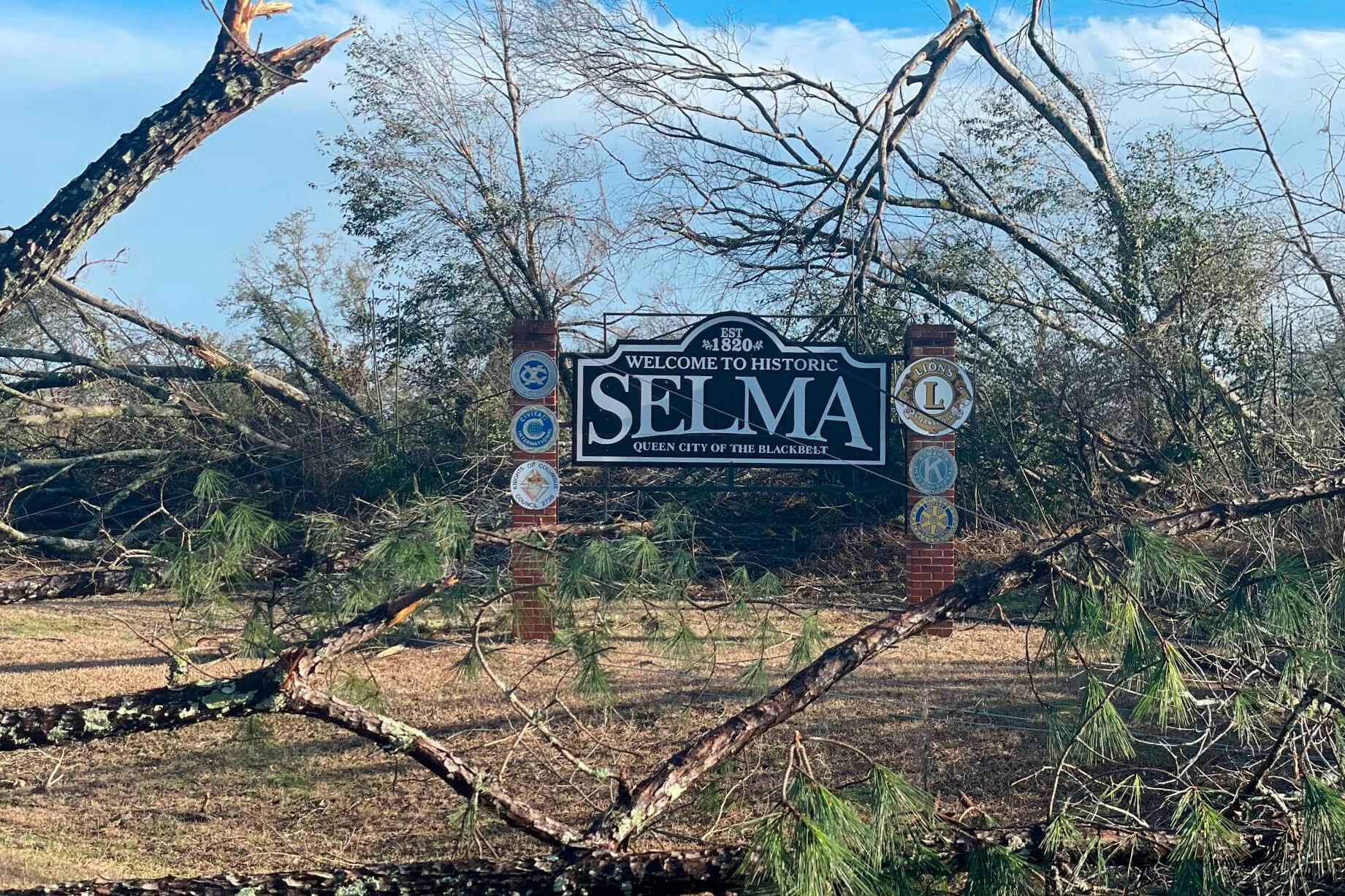Selma, Alabama. The church is gone. All that remains of the Reformed Presbyterian Church is a log pile and some crumbled bricks. You can’t even tell it was a church.
There are 145-year-old beams, buried in the mud. Loose-leaf hymnal pages are scattered to the wind. This church used to be a school for freed slaves after the Civil War. It was a landmark. Now it’s rubble.
“Crazy, ain’t it?” says one local man, standing beside me on the sidewalk.
The man wears a University of Alabama ball cap. He is tall and lean, chewing something that requires him to spit occasionally. There are holes in his jeans and in his shoes. He lives nearby, and he’s surveying the church’s damage.
“Can’t believe it’s gone,” he says.
Last week, an EF-2 tornado tore through Alabama like a hellhound. This storm ripped into Dallas County, killed seven in Autauga County, then visited Georgia, where it killed two more. Including a little boy.
To quote my new friend, “This town got totally [bleeped], man.”
He’s right. Selma looks like someone tried to wipe the city off the map. Rooftops were waylaid on front lawns. Live oaks look like fallen soldiers. An uprooted oak on Mabry Street was hurled into a century-old home.
Local churches got it, too. The steeple at Fairview Baptist was ripped off. Crosspoint Christian Church had 70 daycare kids and 14 staff members inside when the rooftop was sucked off.
Sheila Stockman was one of the teachers. “I was actually on the phone with my mother asking her where the tornado was. She said ‘It’s heading directly to you!’”
My new friend and I are interrupted when a Toyota SUV passes us slowly. Maryland tags. Inside is a guy photographing damage from the driver’s window. He uses the kind of camera that costs more than dental school.
“Crazy, ain’t it?” says my new friend in mock disbelief.
“Those [bleeping] reporters have been all over this town since it happened, taking pictures. Reporters only come around here because they know the name ‘Selma’ sells they newspapers.”
I ask the man if it’s possible these journalists are simply documenting the destruction, and doing their jobs.
He laughs at me. “[Bleep],” he replies. “When’s the last time you heard the national news say anything good about Selma? They only come here when the [bleep] hits the fan. They ain’t know us.”
Maybe what this man means is, the visiting media persons aren’t focusing on the right things. Perhaps, during a journalist’s perfunctory visit, shortly before leaving to catch a noon flight to LaGuardia, they overlook certain things.
The journalists might have missed, for example, the mile-long motorcade at Selma First Baptist a few days ago. The cars came from Montgomery’s Metropolitan United Methodist. Ordinary people came with trunks full of canned goods and toiletries. They distributed food and cheer by the metric ton.
Or how about the chainsaw crews? Selma has been nothing but a mass choir of chainsaws since the storm. Many residents report hearing chainsaws begin only minutes after the tornado.
How about all the dually trucks with Perry, Lowndes, Wilcox, Marengo and Chilton license plates? The trucks tow Bobcats, commercial wood chippers and cherry pickers. Nobody is paying these guys to be here.
You probably didn’t hear about the Knights & Orchids Society, either. Over on Broad Street, the organization has been slammed, doling out baby food, diapers, formula, wipes and water to needy mothers.
What about the free meals at First Baptist? The church groups feeding and bathing Selma’s elderly residents? The donations of clothing from surrounding churches? I’m just skimming the surface. This town has been a veritable feast of beneficence and kindness.
If you don’t believe me, ask Greg Woodson, treasurer of the destroyed church I told you about.
“It’s been overwhelming,” Woodson told The Selma Times Journal. “People have been wanting to come from all over. We had a gentleman come from Louisiana who came up and just gave us $1,000, just like that, for the benefit of the church. He was a pastor of a church in Louisiana. It just soothes my heart and warms my heart to know that there are people out there who are so kind and just want to help on a whim.”
Another SUV drives by. Pennsylvania tags. A gal gets out. She hurriedly snaps photos of devastation.
And I can’t help but wonder whether she will have time during her Selma visit to report on something beautiful? Maybe meet some volunteers, work crews, men’s ministries rebuilding homes, or elderly women serving meals in a church kitchen.
My new friend gives the visiting reporter a friendly wave. The reporter doesn’t even acknowledge us. She crawls into her vehicle and speeds away.
The man turns to me. “Crazy, ain’t it?” he says.
Sure is.
Sean Dietrich is a columnist and novelist known for his commentary on life in the American South. He has authored nine books and is the creator of the “Sean of the South” blog and podcast. The views and opinions expressed here are those of the author and do not necessarily reflect the policy or position of 1819 News. To comment, please send an email with your name and contact information to Commentary@1819News.com.
Don’t miss out! Subscribe to our newsletter and get our top stories every weekday morning.









